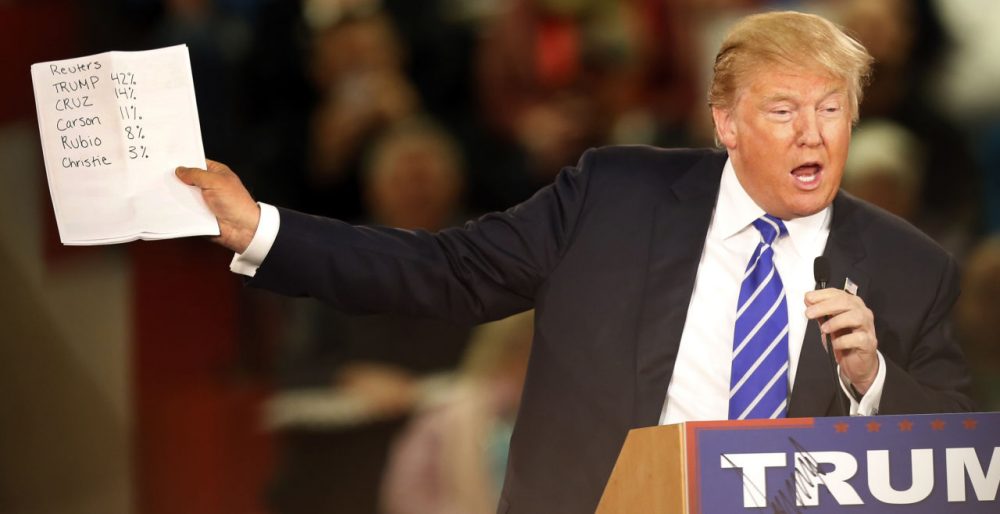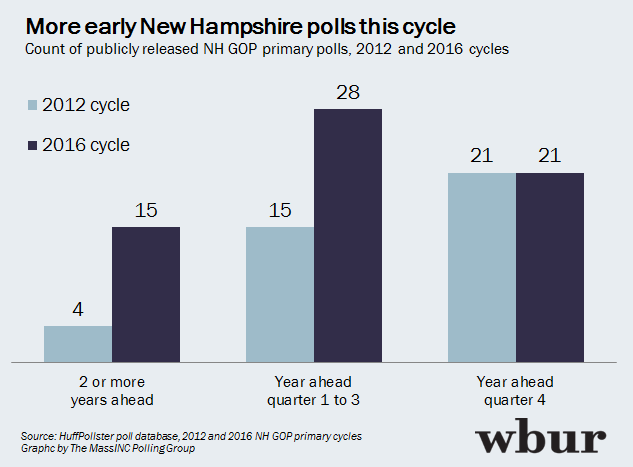Advertisement
Analysis: New Hampshire 'Pollmageddon'? Not Yet

To hear some in the media tell it, voters -- and voters in early-voting states in particular -- are drowning in a flood of polls.
The Boston Globe reported a 90 percent increase in early state polls, including a jump from 29 New Hampshire polls at the same point in 2011 to 60 polls this cycle. “At times," the article reads, "the race can have the feel of watching a football game in which the announcers read off the score every few seconds, with a lot more emphasis on the score rather than the game itself.”
But a closer look at New Hampshire polling shows there is no difference in the number of GOP primary polls conducted in recent months compared with 2011 (there was no Democratic contest in 2012). The game, at this stage, is just about the same as in past years. The difference in total polls comes from the fact that pollsters started surveying New Hampshire earlier, not that they are polling any more often at this point.
Or, to use the Globe’s analogy, the presidential election "football game" at this stage is much as it has ever been. The difference is that the game has now been extended to roughly 283 minutes long instead of the traditional 60. It’s hard to blame pollsters for this, since the media and the political establishment have far more say than pollsters in the length of the campaigns.
Changes to the poll count in New Hampshire this cycle represent a clear sign of this eternal campaign. In 2012, there were just four polls done more than a year out (i.e., 2010 or earlier). This cycle, there were 15, including nine in 2014, five in 2013 and, amazingly, one done in August of 2012. Most of the very early polling was done by Public Policy Polling or the University of New Hampshire/WMUR-TV, which has been conducting quarterly polls on the race.
Excluding these early polls and focusing only on the year prior to the election, there were 36 polls done in 2011, versus 48 done in 2015. This works out to 12 additional polls, or one more per month -- hardly a huge increase or one that represents a sea change in the way campaigns are covered. And once again, the increase that was present was again concentrated further back in time, with the first three quarters of 2015 making up the entire increase for the year.

The last three months of 2015 featured 21 poll releases in New Hampshire -- exactly the same number as the comparable period in 2011. These later polls are from a slightly different mix of pollsters, including WBUR, which has released four GOP polls since September and did none in the 2012 cycle, but the overall number is the same. If you are just tuning in, like most normal people, your scoreboard readings (to borrow a phrase) are coming about as often as they have in the past.
One hazard of more polls in a state the size of New Hampshire would be exhausting respondents with constant polls. But if you live in New Hampshire, you are probably getting called less for public polls than in 2011. The 2011 polls included 20,638 respondents; the 2015 polls that included some phone calls reached 19,158, or about 8 percent fewer voters. That number is likely even lower, because some of the 2015 phone polls used a mix of phone calls and online surveying.
Of course, there are other factors that could lead New Hampshire voters to deep-six their phones before the primary. In 2012, there were an additional 15 polls done in the nine days of January leading up to the Jan. 10 voting. It’s possible we’ll see that many or more with five full weeks until New Hampshire votes on Feb 9. And we are only looking at publicly released polls here -- mostly done by media outlets. These figures don’t count the internal polling done by campaigns -- or, this year, their unofficially affiliated super PACs. Given the size of the GOP field, voters may be getting polled more by the candidates than by the media.
So media reports of peak polling seem largely exaggerated at this point. In the Granite State, at least, there has been no real explosion of polling, just a continuation of the trend of making the campaign season longer and longer. This, as well as the fixation with the “scoreboard,” says more about the campaigns and the media than about polling itself. Show up way too early for the game, and focus only on the scoreboard, and the broadcast will indeed seem frenetic and impoverished.
Steve Koczela is president of the MassINC Polling Group and a regular contributor to WBUR Politicker. He oversees WBUR's polls, including polling of New Hampshire. He tweets at @skoczela.
Update: We've updated this story to make it clear that the author oversees WBUR's polls, including polling of New Hampshire.
This article was originally published on January 07, 2016.